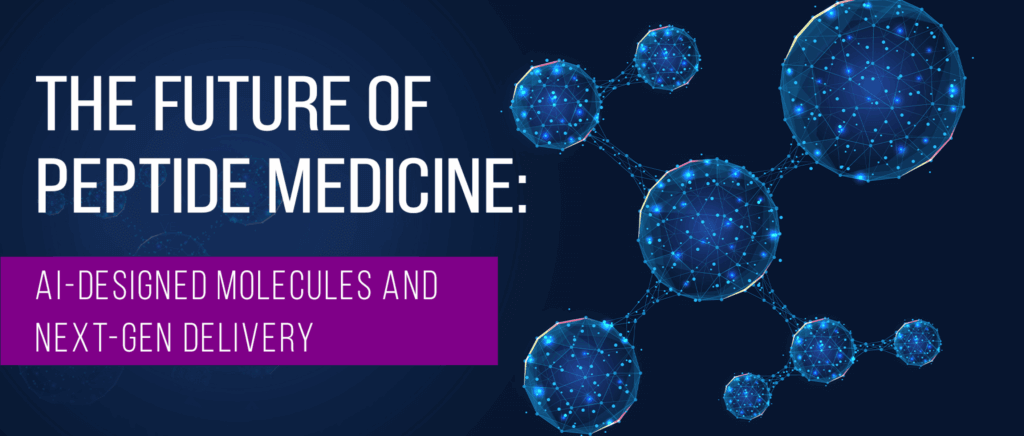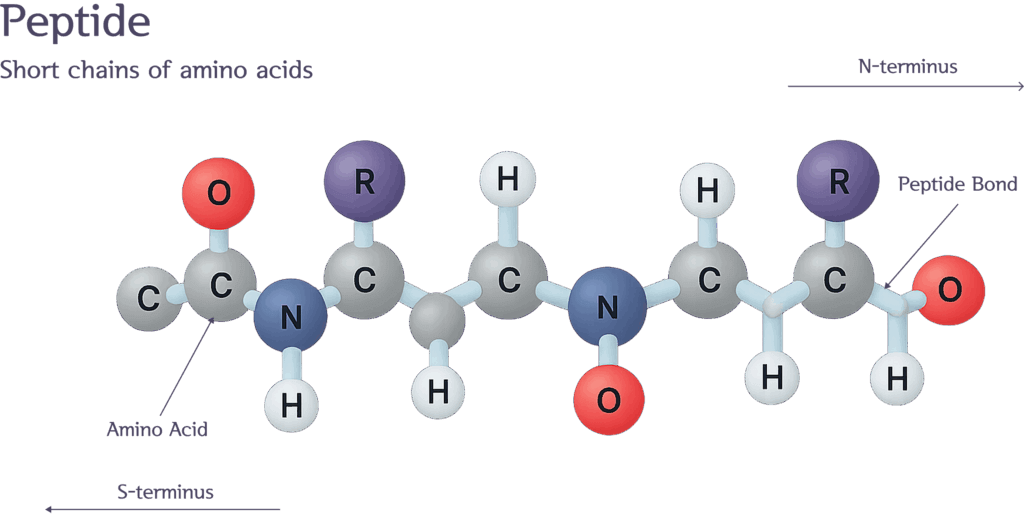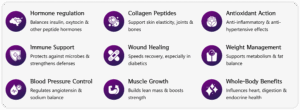
In just a few short years, perception of artificial intelligence (AI) technology has evolved from a dystopian threat to existing social systems, to an invaluable tool for saving time and augmenting human endeavors in nearly every industry. The medical field is no exception – AI is transforming medicine, from administrative and operating systems, all the way to drug development and delivery.
At the same time, new information about the role of peptides in human health has sparked an interest among medical researchers seeking to harness the power of peptides for use in AI-designed therapies. Learn more about this exciting new field, and what AI-engineered peptides can mean for the future of patient health.
Peptides and Their Impact on Human Health
Peptides are short chains of amino acids linked by peptide bonds. Peptides play crucial roles in a broad range of biological processes, many of which are yet undiscovered. Thanks to an ever-growing body of research, peptides have captured the interest of medical researchers looking for safer, more effective therapies to target specific conditions and diseases.

Peptides provide numerous health benefits:
- Hormone regulation – Some hormones, like insulin and oxytocin, are peptide hormones. They bind to cell receptors to trigger specific responses. For example, insulin ushers glucose into the cells for energy production, and oxytocin promotes human bonding, and is a key player in childbirth and human milk production.
- Immune support – Peptides can destroy microbes and serve as alternatives to antibiotics, especially for fighting resistant bacteria..
- Angiotensin peptides help to regulate blood pressure and maintain sodium balance throughout the body.
- Collagen peptides support joints and connective tissues, help maintain healthy skin, reduce wrinkles and combat aging. They also help maintain bone mineral density and prevent age-related bone loss.
- Antimicrobial and collagen peptides promote faster wound healing, especially in diabetic patients.
- When combined with exercise, growth hormone peptides promote lean muscle mass and enhance muscle strength.
- Bioactive dietary peptides have antioxidant, anti-inflammatory, and anti-hypertensive properties.
- Peptides help in weight management and mitigate metabolic disorders associated with obesity.
- Peptides influence cardiovascular function, digestion, endocrine balance, and a broad range of other metabolic processes.


While your body manufactures various peptides from the foods you eat, their benefits can be limited in people who are protein deficient. When it comes to targeting specific health conditions, higher concentrations of peptides may be necessary. By finding new ways to isolate and replicate peptides, researchers hope to make them more widely available, patient-friendly, and targeted for human health.
How AI is Shaping the Future of Peptide Discovery and Design
To steer the future of peptide medicine, scientists are tapping into artificial intelligence to address common challenges in drug development, such as limitations in stability, bioavailability, and targeted delivery. Generative AI is being used to accelerate the discovery of novel peptide molecules and optimize their effectiveness. At the same time, advanced delivery technologies are being explored to find the most effective ways to administer peptide therapy to patients.
Traditionally, peptide drug discovery has been a slow and resource-intensive process, with high rates of failure. Now, tedious research and lab-based screening is being augmented by AI, reducing time to discovery by offering a more efficient and predictive approach. With AI, massive data bases can be rapidly scanned to identify novel peptide sequences with specific properties, such as high affinity for binding, selectivity, and minimal toxicity, transforming the process from trial-and-error to quick and precise discovery.
Generative AI models can create new peptide sequences, or design peptide chains that bind to disease-specific proteins. For example, scientists are using GenAI to design peptides that target tangled or disordered proteins, such as those found in neurodegenerative conditions like Alzheimer’s and Parkinson’s disease.
Before a peptide reaches the lab, AI can help to assess and optimize critical characteristics like a peptide’s stability, half-life, and immunogenicity, increasing the likelihood of the peptide’s success in clinical trials, and saving substantial amounts of time and money.
Peptides & AI
Next-Generation Peptide Delivery Systems
Historically, peptide therapy has been riddled with challenges like stability, poor bioavailability, and limited permeability across biological barriers, such as the blood-brain barrier. GenAI systems are meeting such challenges head-on by designing more targeted and patient-friendly delivery methods that improve patient compliance.
Next-gen delivery systems include:
- Nanocarriers made from lipids or polymers can be used to encapsulate oral peptides, protecting them from degradation during digestion and improving absorption.
- Permeation enhancers can temporarily increase intestinal permeability, enhancing absorption.
- Ingestible devices like microneedle-based capsules can inject peptides directly into the stomach for rapid absorption.
- Targeted delivery systems can concentrate the peptide at a specific treatment site, minimizing side effects.
- Peptide-drug conjugates (PDCs) use peptides to carry a therapeutic drug directly to targeted cells, such as cancer cells.
- Nanocarriers can leverage the body’s natural transport mechanisms to cross challenging biological barriers, like the blood-brain barrier.
- Transdermal microneedle patches can deliver peptides through the skin, eliminating the need for injections.
By harnessing the power of peptides, medicines of the future promise to be safer and more precisely targeted, with fewer side effects and more effective outcomes.
Challenges for the Future of Peptide Medicine
While peptide discovery and development has made promising strides in recent years, AI-generated peptide therapeutics have not yet been approved for commercial markets. Scientists face challenges in terms of validating new peptides in the lab and ensuring their safety and effectiveness for clinical use. And AI models come with their own challenges.
To discover and design specific peptide therapies, AI models need access to large volumes of high-quality data. Unfortunately, data sets are sparse for certain types of peptides, limiting the ability of AI models to make accurate predictions. Moreover, the manufacture of peptide chains is costly and resource-intensive, requiring a high level of quality control. Manufacturers also face regulatory challenges, as new AI-designed peptides and delivery methods are scrutinized for efficacy, safety, and transparency.
Despite these obstacles, there is little doubt that generative AI will play a substantial role in the discovery and design of new peptide therapies that target serious conditions like cancer and Alzheimer’s. Not only can we expect to see a new generation of “miracle drugs” in the near future, but they promise to be safer, more personalized, and patient-friendly.
Get Peptide Therapy Now in NYC
AI-generated peptide therapies may still be a thing of the future, but you don’t have to wait for more research and development to leverage the health benefits of peptides. Invita Wellness in SoHo offers personalized peptide injection therapy to help you perform better, grow stronger and extend your healthspan. Contact Invita Wellness today, and learn how peptides can help optimize your health for a better quality of life, today and in the years to come.
Get Peptide Therapy Now in NYC
contact InVita Wellness today
Book Now
456 Broadway 2 Floor, New York, NY 10013, USA
Resources
Chen, Zhiheng, et al. “The role and future prospects of artificial intelligence algorithms in peptide drug development.” Biomedicine & Pharmacotherapy 175 (2024): 116709.
https://www.sciencedirect.com/science/article/pii/S0753332224005936
Hwang, Ji Su, et al. “Development of anticancer peptides using artificial intelligence and combinational therapy for cancer therapeutics.” Pharmaceutics 14.5 (2022): 997.
https://www.mdpi.com/1999-4923/14/5/997